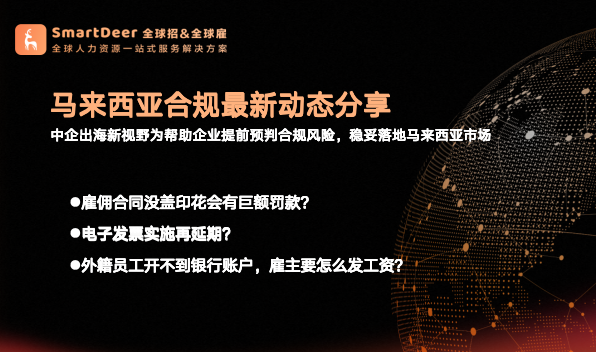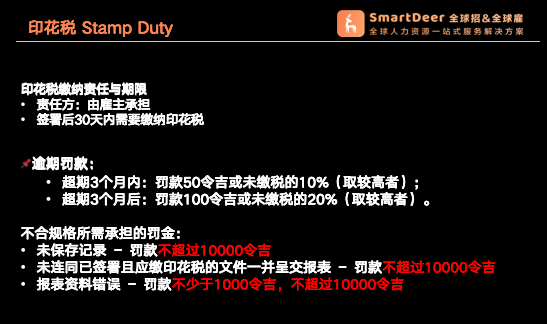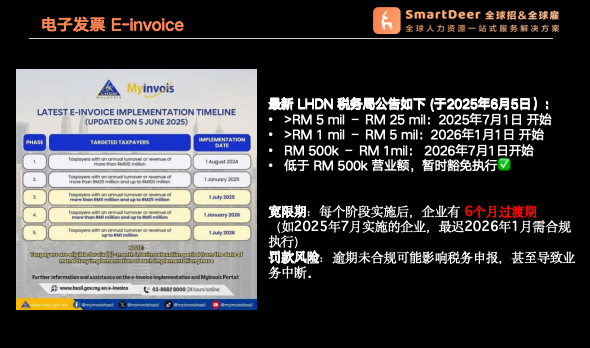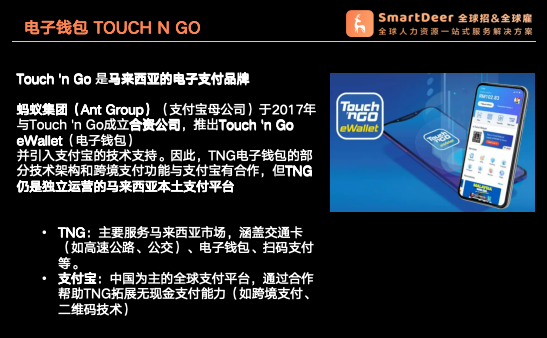As Chinese enterprises accelerate their expansion into Southeast Asia, Malaysia is emerging as a key destination due to its strategic location, open business environment, and multicultural landscape. However, recent changes in regulations—such as stamp duties on employment contracts, the introduction of an electronic invoicing system, and salary payments for foreign employees—are posing new challenges for compliance management.
To help businesses proactively identify compliance risks and smoothly enter the Malaysian market, SmartDeer is launching the 20th session of its “Going Global” webinar series: Understanding the Latest Employment Compliance Trends in Malaysia.
This session will feature Karen, SmartDeer’s Malaysia Market Lead, and Richard, Operations Director at Zhipai HR, as guest speakers. Drawing on firsthand local cases, they will break down the latest policy updates and implementation challenges, offering attendees a structured and practical guide to employment compliance in Malaysia.
| A Malaysian Chinese with an MBA degree, she has over 8 years of experience in business development and human resource solutions. She has led key expansion projects for multinational companies and is well-versed in Malaysian labor laws, business registration procedures, and other compliance requirements. She also has extensive hands-on experience in supporting new enterprises to expand overseas from the ground up. |  |
 | With over 10 years of experience as an in-house HR Director, he has worked extensively across the finance, education, and retail sectors, serving multiple well-known enterprises. He specializes in organizational development, talent strategy, and full-spectrum HR management. In 2020, he transitioned into entrepreneurship by founding a human resource outsourcing company, seamlessly integrating the in-house (client-side) perspective with outsourced service delivery to provide comprehensive HR solutions for businesses. |
highlight of review

Malaysia – A Strategic Gateway for Chinese Enterprises Expanding into Southeast Asia
- Linguistic Diversity: A strong talent pool proficient in English, Malay, and Chinese.
- Manageable Labor Costs: Average monthly salary ranges from MYR 2,000 to 4,000.
- Supportive Digital Policies: Government encourages industries such as AI, cloud computing, and data centers.
- Cultural Adaptation: Considerations include Muslim prayer times, Ramadan fasting, and non-unified regional public holidays.
- Clear Work Visa Requirements: Criteria include job justification, local-to-foreign staff ratios, and minimum salary thresholds.

Restructuring of the Stamp Duty System: Contracts Must Be Stamped, with Strict Penalties for Non-Compliance
Starting in 2025, all employment contracts in Malaysia will be subject to a fixed stamp duty of MYR 10 per document. Late payments exceeding three months will incur a penalty of MYR 100 or 20% of the unpaid amount—whichever is higher. Supplementary agreements that carry legal validity will also be subject to stamp duty.
Karen emphasized that documents with the following five core characteristics will be recognized as employment contracts and must comply with stamp duty regulations:
- Clearly identify the employer and employee (including SSM registration details, identity card numbers, etc.);
- Specify salary payment timing;
- State working hours and location;
- Include statutory benefits such as EPF, SOCSO, EIS, and HRDF;
- Contain clauses that prohibit unauthorized third-party employment.
Contracts signed in 2025 may settle stamp duty by year-end to qualify for exemptions. Starting from 2026, contracts must comply with the rule of stamp duty payment within 30 days of signing, with strict enforcement measures in place.

Mandatory Implementation of E-Invoicing: Phased Rollout Based on Annual Revenue
Malaysia’s e-invoicing policy will be rolled out in phases starting from 2025:
- Businesses with annual revenue between MYR 1 million and MYR 5 million: Implementation begins January 2025
- Businesses with annual revenue between MYR 500,000 and MYR 1 million: Implementation begins July 2025
- Businesses with annual revenue below MYR 500,000: Temporarily exempted
Invoices must be issued through the MyInvois system or compatible accounting software (such as SQL or INFOTECH), and must adhere to XML or JSON formats only. Each invoice will be issued with a unique QR code, and both buyer and seller will have 72 hours to reject or respond to the invoice.
The government is offering a 6-month transitional grace period to help businesses adapt smoothly to the new system.

New Salary Payment Solution for Foreign Workers: Compliant Without a Bank Account
To address the challenges foreign employees face in opening bank accounts and receiving salaries, Karen introduced a compliant salary payment solution: using the Touch’n Go eWallet, a product co-developed by Ant Group. Foreign workers can register with just a passport, and employers can transfer salaries via DuitNow, directly from a bank account to the employee’s eWallet.
Workers can then transfer or receive funds in real-time, and even use cross-border remittance services to send money to family members back home.
This cross-border remittance feature supports transfers to 58 countries, including Indonesia, the Philippines, Singapore, Thailand, Vietnam, Bangladesh, India, Nepal, Pakistan, Sri Lanka, and more.
In this session, Karen and Richard provided in-depth analysis of key policy updates and their impact on HR strategies. They also explored best practices for global compliant employment, empowering businesses to navigate international expansion with confidence.
SmartDeer will continue to monitor regulatory developments in overseas markets, and is planning an upcoming policy webinar focused on Indonesia.
To register for future sessions, please scan the QR code below to connect with our event assistant.
We look forward to seeing you at the next session!

Connect with your dedicated advisor instantly and stay informed on the latest regulatory trends.
发表回复